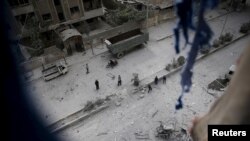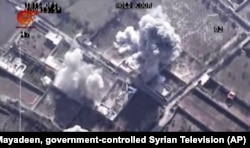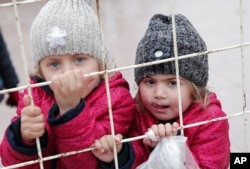For civilians in northern Syria, fleeing conflict can take you right back into conflict. Wherever you turn there is war.
Escape from blistering Russian airstrikes, a ground offensive by President Bashar al-Assad’s forces in the north of the country and marauding Islamic State militants create ever more a death lottery with each passing hour - Mad Max: Fury Road but with warplanes added as well as cluster and vacuum bombs.
And even when luck has accompanied your trek, and safety is within reach a few hundred meters away, there is the final peril of death at the hands of Turkish border guards.
“At least with coalition airstrikes you know they are targeting actual Daesh positions and buildings, you stay away from them,” says 46-year-old Abu Ahmed, using an Arab acronym for Islamic State.
Dangerous times for civilians
A father of nine and grandfather of three from the town of Al-Bab, 46 kilometers northeast of the city of Aleppo, said life has become a game of chance for civilians in northern Syria.
Al-Bab is controlled by Islamic State militants and has been targeted by both U.S.- led coalition warplanes and Russian jets.
Sitting in a park in the Turkish border town of Kilis, the stocky, mustachioed auto repairman shook his head at what war has reduced his hometown to and on what he had seen on the roads from Al-Bab to Turkey, 62 kilometers distance. He arrived in Turkey three days ago.
He decided to flee and to get his family out after his house was badly damaged in what he believes was a Russian airstrike. He says the destruction in Al-Bab is shocking with the town impacted by weeks-long barrages of missiles and bombs, artillery and rockets.
Refugee: Russian airstrikes 'different'
“The Russian airstrikes don’t discriminate,” he says. “They are not targeting Daesh - they are hitting everything and everyone.” Before the war, Al-Bab had a population of 65,000, but in recent months the population increased dramatically, swollen by displaced civilians, he says.
Now he says he doubts there are more than 10,000 civilians left in the town.
He and his family made separate escapes last week: seven family members with the help of people smugglers involving a long meandering route consisting in the first phase of a long slog through muddy fields to exit IS territory; and he, more directly by car. They had to do it that way. He could talk his way past IS guards because of his car repair business, but the others would have been stopped trying to flee Al-Bab.
Perilous trip out of Syria
“There is terrible havoc on the roads,” he says. “There are hundreds of people, many women and children, walking in the fields carrying small bundles, occasionally a suitcase,” he says. “It has been raining, so after a few steps they get bogged down, their feet caked in mud,” he adds.
The roads of the northern Aleppo countryside already rutted and hazardous before the latest Assad offensive are now even more challenging with huge craters forcing cars to go off the road and risk getting stuck in mud. Abu Ahmed was fortunate, moving forward gingerly and stopping frequently to avoid being targeted by warplanes passing overhead; he made the border crossing at Bab al-Salameh.
A trader friend persuaded Turkish guards to let him through.
His family had a much rougher time of it.
He paid smugglers $1,050 to guide seven family members out of IS territory; first by car from Al-Bab to a nearby village and then skirting checkpoints in a four-hour trudge through bog-like fields with frequent stomach-churning halts to avoid IS patrols mainly of Tunisian and Turkish jihadists.
In the distance they could see flashes and the glow of fires; they heard explosions. They prayed warplanes wouldn’t come near. Eventually they made a rebel Free Syrian Army (FSA) checkpoint on the outskirts of Ihras near the border town of Azaz where the fighters gave the children milk and shared the little food they had, and then hurried them along, saying, “Warplanes could come any second.”
With little chance to navigate illegally the locked-down Turkish border near Bab al-Salameh, a few kilometers away, the family then traveled by car across a swathe of Aleppo countryside, risking airstrikes, to neighboring Idlib province, and then the town of Jisr al-Shughur. The smugglers charged another $700 for that part of the journey and eventually guided them illegally through the border near Bab al-Hawa - another long, frightening trudge through difficult terrain and the fear of watchtower spotlights illuminating them.
Bomb-dodging journey
For Mohammed, a student from the IS-controlled town of Manbij, 90 kilometers northeast of Aleppo, the journey to Turkey nearly ended in disaster several times.
He left Manbij with 250 people split into four groups at the dead of night. Each person paid the smugglers $200 to escape jihadist-held territory, first by cars to a nearby village and then a seven-hour hike through olive groves and fields.
“It was cold, very cold,” Mohammed told me sitting in a cramped one-room apartment in the Turkish border town of Gaziantep he has shared since he arrived in Turkey four days ago. “We skirted villages and isolated houses. The smugglers sent lookouts ahead to scout. It was hard keeping the small kids quiet. We crept forwards slowly, carefully,” he recalls. “We could hear the warplanes flying overhead,” he adds.
“We were about 30 meters away from a farm building, which got hit by two missiles. Two of our group were killed,” he says. The smugglers scattered the refugees and as the building burned silhouetting the refugees, they gathered up the kids and rushed them into the fields. From 5 a.m. to 8 a.m., they hid fearing FSA fighters would start shooting at them, thinking they were jihadists or regime militiamen closing for an attack.
Later, they too, once in FSA-controlled territory, navigated fitfully across the battlefields of northern Syria in well spread-out groups of cars and mini-vans. They dodged skirmishes and avoided advancing regime forces. And they saw wreck and ruin as they traveled - with villages razed, burning buildings sending billowing acrid, black clouds into the sky. And they saw hundreds of mainly women and children picking their way through fields heading as best they could away from the clash of arms.
Then, still in the Aleppo countryside close to Idlib, the warplanes came, hitting a stalled car behind the mini-van Mohammed was in and killing the occupants. That wasn’t their last encounter with airstrikes. That night, sleeping in a village, four of their number were killed in another raid that obliterated one of the houses in which they had sought sanctuary.
“The next day they made it into Idlib province, where it was suddenly quiet,” says Mohammed, a lanky, dark-haired, dark-eyed 19-year-old. There he met a family from the Iraqi city of Mosul who had had made an epic 10-day journey to make it to Idlib. Near the border, they had to wait from 11 a.m. until 9 p.m. before the border smugglers thought it was safe to try to make an illegal crossing into Turkey involving another seven-hour, ankle-twisting trudge through rocky and uneven ground.
“The wires had been cut by the smugglers before,” he says. He carried a toddler on his shoulders for much of the slow-moving march. Each 20 or so steps, the smugglers would have them stop and crouch, hoping nearby Turkish guards wouldn’t spot them.
And then they were in Turkey, exhausted. “I can’t describe how it felt to be safe,” says Mohammed, picking at his red T-shirt. He says: “We wanted Assad to go; but it seems it is the Syrians who are leaving - or trying to.”






